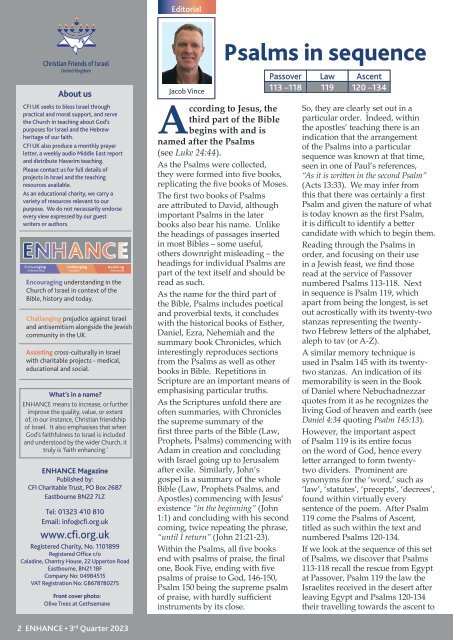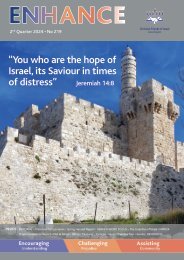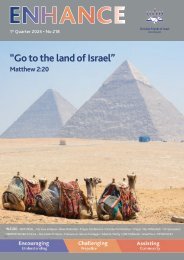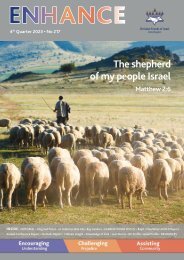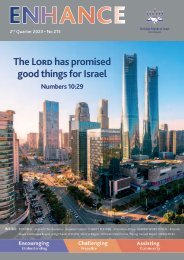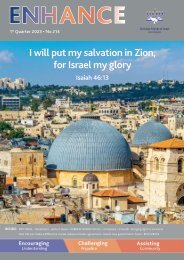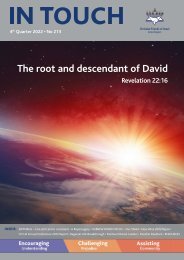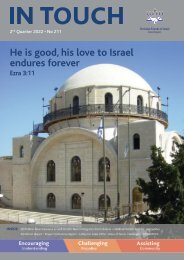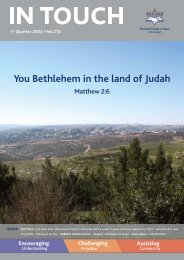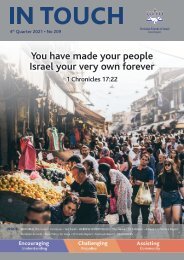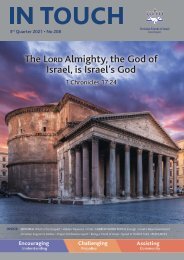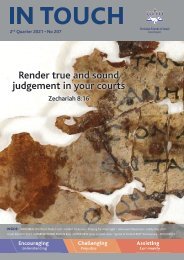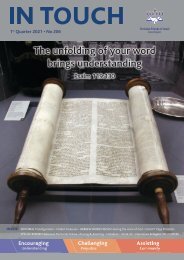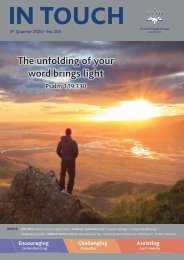ENHANCE - 3rd Quarter 2023
The third quarter magazine from Christian Friends of Israel UK, with articles on the Psalms, the Hebrew word 'Av', the Codex Sassoon and United Hatzalah.
The third quarter magazine from Christian Friends of Israel UK, with articles on the Psalms, the Hebrew word 'Av', the Codex Sassoon and United Hatzalah.
Create successful ePaper yourself
Turn your PDF publications into a flip-book with our unique Google optimized e-Paper software.
Editorial<br />
Christian Friends of Israel<br />
United Kingdom<br />
About us<br />
CFI UK seeks to bless Israel through<br />
practical and moral support, and serve<br />
the Church in teaching about God’s<br />
purposes for Israel and the Hebrew<br />
heritage of our faith.<br />
CFI UK also produce a monthly prayer<br />
letter, a weekly audio Middle East report<br />
and distribute Haverim teaching.<br />
Please contact us for full details of<br />
projects in Israel and the teaching<br />
resources available.<br />
As an educational charity, we carry a<br />
variety of resources relevant to our<br />
purpose. We do not necessarily endorse<br />
every view expressed by our guest<br />
writers or authors.<br />
Encouraging understanding in the<br />
Church of Israel in context of the<br />
Bible, history and today.<br />
Challenging prejudice against Israel<br />
and antisemitism alongside the Jewish<br />
community in the UK.<br />
Assisting cross-culturally in Israel<br />
with charitable projects - medical,<br />
educational and social.<br />
What’s in a name?<br />
<strong>ENHANCE</strong> means to increase, or further<br />
improve the quality, value, or extent<br />
of, in our instance, Christian friendship<br />
of Israel. It also emphasises that when<br />
God’s faithfulness to Israel is included<br />
and understood by the wider Church, it<br />
truly is ‘faith enhancing.’<br />
<strong>ENHANCE</strong> Magazine<br />
Published by:<br />
CFI Charitable Trust, PO Box 2687<br />
Eastbourne BN22 7LZ<br />
Tel: 01323 410 810<br />
Email: info@cfi.org.uk<br />
www.cfi.org.uk<br />
Registered Charity, No. 1101899<br />
Registered Office c/o<br />
Caladine, Chantry House, 22 Upperton Road<br />
Eastbourne, BN21 1BF<br />
Company No: 04984515<br />
VAT Registration No: GB678780275<br />
Front cover photo:<br />
Olive Trees at Gethsemane<br />
Jacob Vince<br />
Psalms in sequence<br />
Passover<br />
113 –118<br />
According to Jesus, the<br />
third part of the Bible<br />
begins with and is<br />
named after the Psalms<br />
(see Luke 24:44).<br />
As the Psalms were collected,<br />
they were formed into five books,<br />
replicating the five books of Moses.<br />
The first two books of Psalms<br />
are attributed to David, although<br />
important Psalms in the later<br />
books also bear his name. Unlike<br />
the headings of passages inserted<br />
in most Bibles – some useful,<br />
others downright misleading – the<br />
headings for individual Psalms are<br />
part of the text itself and should be<br />
read as such.<br />
As the name for the third part of<br />
the Bible, Psalms includes poetical<br />
and proverbial texts, it concludes<br />
with the historical books of Esther,<br />
Daniel, Ezra, Nehemiah and the<br />
summary book Chronicles, which<br />
interestingly reproduces sections<br />
from the Psalms as well as other<br />
books in Bible. Repetitions in<br />
Scripture are an important means of<br />
emphasising particular truths.<br />
As the Scriptures unfold there are<br />
often summaries, with Chronicles<br />
the supreme summary of the<br />
first three parts of the Bible (Law,<br />
Prophets, Psalms) commencing with<br />
Adam in creation and concluding<br />
with Israel going up to Jerusalem<br />
after exile. Similarly, John’s<br />
gospel is a summary of the whole<br />
Bible (Law, Prophets Psalms, and<br />
Apostles) commencing with Jesus’<br />
existence “in the beginning” (John<br />
1:1) and concluding with his second<br />
coming, twice repeating the phrase,<br />
“until I return” (John 21:21-23).<br />
Within the Psalms, all five books<br />
end with psalms of praise, the final<br />
one, Book Five, ending with five<br />
psalms of praise to God, 146-150,<br />
Psalm 150 being the supreme psalm<br />
of praise, with hardly sufficient<br />
instruments by its close.<br />
Law<br />
119<br />
Ascent<br />
120 –134<br />
So, they are clearly set out in a<br />
particular order. Indeed, within<br />
the apostles’ teaching there is an<br />
indication that the arrangement<br />
of the Psalms into a particular<br />
sequence was known at that time,<br />
seen in one of Paul’s references,<br />
“As it is written in the second Psalm”<br />
(Acts 13:33). We may infer from<br />
this that there was certainly a first<br />
Psalm and given the nature of what<br />
is today known as the first Psalm,<br />
it is difficult to identify a better<br />
candidate with which to begin them.<br />
Reading through the Psalms in<br />
order, and focusing on their use<br />
in a Jewish feast, we find those<br />
read at the service of Passover<br />
numbered Psalms 113-118. Next<br />
in sequence is Psalm 119, which<br />
apart from being the longest, is set<br />
out acrostically with its twenty-two<br />
stanzas representing the twentytwo<br />
Hebrew letters of the alphabet,<br />
aleph to tav (or A-Z).<br />
A similar memory technique is<br />
used in Psalm 145 with its twentytwo<br />
stanzas. An indication of its<br />
memorability is seen in the Book<br />
of Daniel where Nebuchadnezzar<br />
quotes from it as he recognizes the<br />
living God of heaven and earth (see<br />
Daniel 4:34 quoting Psalm 145:13).<br />
However, the important aspect<br />
of Psalm 119 is its entire focus<br />
on the word of God, hence every<br />
letter arranged to form twentytwo<br />
dividers. Prominent are<br />
synonyms for the ‘word,’ such as<br />
‘law’, ‘statutes’, ‘precepts’, ‘decrees’,<br />
found within virtually every<br />
sentence of the poem. After Psalm<br />
119 come the Psalms of Ascent,<br />
titled as such within the text and<br />
numbered Psalms 120-134.<br />
If we look at the sequence of this set<br />
of Psalms, we discover that Psalms<br />
113-118 recall the rescue from Egypt<br />
at Passover, Psalm 119 the law the<br />
Israelites received in the desert after<br />
leaving Egypt and Psalms 120-134<br />
their travelling towards the ascent to<br />
2 <strong>ENHANCE</strong> • 3 rd <strong>Quarter</strong> <strong>2023</strong>


